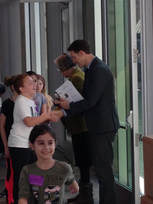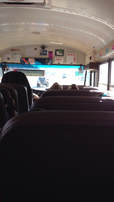
We don't get enough of these opportunities to apply our Core Behavior outside of our school, so it's refreshing for a teacher to see a direct application of the skills we have stressed all year long.
 At the end of our Crystal Bridges experience, last Friday, our class was confronted by a couple of executives of the museum. The gentleman was introduced as the executive director of the complex. I shook hands with the two and informed them that our fourth grade teachers would be returning, this summer for some professional development. Students then took over the handshaking detail as they smiled at the two adults and greeted them with direct eye contact and hardy handshakes. We don't get enough of these opportunities to apply our Core Behavior outside of our school, so it's refreshing for a teacher to see a direct application of the skills we have stressed all year long.
0 Comments
We were having such a good time with our fraction work that we invited Assistant Principal McCombs to join us and watch. She was floored by the level of engagement at which our students were operating. The excitement of our Mr. Culbertson's and my classes was infectious. "I used to not get this, but now I do," one student proclaimed. Another told us, "I used to not like math, but now I do." Still another wasn't giving up: "I just don't get it yet," she said. When one looks at the notes of our students, he has to wonder about the level of work being performed. For the record, it's fourth grade level, and it's not as advanced as it appears. It's really more of a matter of making sure our students understand the concepts we are teaching them. Many of us remember our own math classes: you know the ones that filled us with formulas and told us they just work, because they work. I never did understand the why of those formulas, and I struggled to understand. I needed to be shown how the formulas operated and not just told that the rules are the rules because they are the rules. I hope we are doing a better job of making sure kids don't have those same issues in our classes.
At any rate, it is always a joy to teach a class of happy children who are pleased with themselves because they have achieved something unexpected. I didn't get enough pictures from our trek inside the museum at Crystal Bridges, but I did get this little assortment, including the giant self-sculpture that captured students' attention. By this time, other patrons had entered the museum complex. Individuals and groups were mingling in common areas, and my 17 students and I meandered through them with ease. Once again I was impressed with the respectful way that students observed the artwork. I was able to trust them with a little more freedom in galleries, and they were able to be free and still stay with the group. They appreciated the black-and-white gallery, the self-portraits, and the abstract pieces.
It's still a shame we couldn't spend more time in the colonial and early American history section due to its current renovation.
Last Friday's field trip to Crystal Bridges in Bentonville, Arkansas, took us outside after our lunch. We were on our own for the afternoon, so we explored the beautiful, natural setting that surrounds the museum, including the outdoor displays. Some of the kids got tired.
I know this isn't much ado about Crystal Bridges, but it is important. First of all, I want to express my appreciation to the museum family for all they provided for our field trip, Friday. They made our trip possible by footing the bill for our buses and drivers, they gave students "goody" bags at the end of the day, and they provided lunch. That's where this post comes in. My students thanked our guide, Ms. Hutchinson for the morning. They looked her in the eye and smiled. I heard Hutchinson tell another docent that she had not had a group this attentive and respectful for at least six months. She asked us if we could possibly come back every day. Entering the dining room, we were told some quick procedures for lunch. Everyone picked up a sandwich, chips, a piece of fruit, and a bottle of water, and proceeded to sit down. I stood to the side so I could supervise while enjoying my own lunch (The sandwich hit the spot.). After a few minutes, I noticed none of my students had napkins. Had they not picked up napkins on their way through the line? No, that wasn't it. Actually, they all had napkins, spread in their laps. Earlier in the week, I had stressed the need to have manners on this day - a need to express some sophistication in such a sophisticated locale...and they remembered. A lot of people don't think this is a big deal. They may believe that I'm reaching here. Why would I make such a thing out of lap napkins?
The point it that our higher standards manifest themselves in the nuances. The difference in the Hoggatteer Experience and others in in the details. This was a real-world application for the ideas I've peddled in our classroom all year, and when the rubber met the road, my class succeeded. Did I mention they make me proud?  Yesterday's bonus field trip to Crystal Bridges brought some rich moments to our year. Our trip to Bentonville, Arkansas, began at 8:30 with a leisurely bus ride through the Ozarks. My students were excited to get started, but once we entered the museum, they curbed their enthusiasm and replaced it with respectful attention to our tour guide, Ms. Hutchinson (although four of our group were with Principal Bozarth's group). While we waited for our tour to begin, a couple of Hoggatteers greeted Ms. Hutchinson with handshakes and conversation. Hutchinson quickly migrated to our area of the room and told me that she called dibs on our group. She told me she was already impressed with their manners and demeanor. Our one-hour tour was entitled The Writing is on the Wall. Ms. Hutchinson took our group through my favorite area, which is currently being renovated, to find a somewhat abstract piece about 42nd Street in New York City. The students had a discussion about the setting of the painting. What do you see? What do you think it sounds like in this setting? How do you think it smells? Students were crazy-focused and really seemed to be invested in the conversation. Before we knew it, Ms. Hutchinson whisked us over to a piece called 184T. She had students write down their ideas about how the long collection of items mounted on the wall made them feel. They were encouraged to use their senses to create their feelings.
Finally, we visited a lifelike sculpture the group named Joe. In a matter of a few minutes, our class made up a story about this melancholy character - a story we are bound to recreate in blog form, next week. Everywhere we went with this tour, our group made me proud. Their involvement and respectful responses to questions continued to move the conversation forward. Ms. Hutchinson made several comments about my students' behavior and manners along the way - something I will continue to report about in the next few posts. Stay tuned for more about our field trip to Crystal Bridges. How far have we come? They keep me on my toes, but we've come so far that I can honestly say that I love these kids. They provide me with so much joy, and they make my job interesting. I wish that every teacher could experience a classroom like ours - one in which I don't have to constantly harp on students to be persistent, one where I don't have to constantly bring students into the hallway for one-on-one "conversations". For example, the math (fractions) that we work on every day has become quite the challenge. It's not undoable, but it's new, and it takes many of us out of our comfort zones. None of my students have given up on their own abilities to do this work. They refuse to stop and say "I can't get it," or "It doesn't make sense." Something we have done has clicked and allowed these students to continue to push forward even when the going gets tough.
For this, I am truly thankful. I prefer driving to flying. When I drive, I can do so on my own terms: leave when I choose, stop when I need to, take impromptu side trips when I get curious. But when I fly, it's all about jumping through someone else's hoops: I'm on someone else's schedule, my luggage has to fit in a box, and I'm stuck in airports while waiting for connecting flights. Yes, I prefer to drive. I like to be the person behind the wheel, in control of the vehicle. When I fly, someone else is in control. It's perfectly nerve-racking. I guess that's why I don't fly very often. As much as I would love to see the scenery between here and there, I also look forward to making the most of my off-time while awaiting my flights, this summer. I'm guessing I may see some interesting characters along the way, as well.
 Our Cecil Floyd fourth grade team will continue a relationship with the Crystal Bridges Museum of American Art even after Friday's field trip. We have invited the Bentonville museum to help us understand how to use art more effectively in our classrooms. We will spend some time with a trainer in our school before the school year is out, as well as a week of on-site training over the summer. We have asked to focus on art that focuses on America's colonial and revolutionary period, in order to support our switch to that period of history from state history. The program will include prints of original artwork to display at Cecil Floyd. I anticipate this to be a high-quality professional development opportunity. This is the week of our second field trip! You read right: it's a second field trip. Your resourceful fourth grade team has found a way to break the rules again. By teaming with Crystal Bridges in Bentonville, Arkansas, we're getting to visit their amazing collection, this Friday. The museum is providing our transportation costs and a healthy lunch. Our classes will not wander aimlessly through this world-class facility; we will take part in a one-hour tour, called The Writing Is on the Wall, described as follows: We're going to work on our behaviors, this week, in preparation for our visit. As people who have already visited the facility will tell you, this collection of art is quite valuable, and we don't want any part in disrespecting it or its creators. The Crystal Bridges collection encompasses 300 years of American art. Every school tour offered by Crystal Bridges reveals the unfolding story of America and inherently includes language arts, social studies, and visual arts standards. Crystal Bridges tours use the dialogical model, a process of student-centered exploration that is designed to deepen critical thinking and discussion skills. That process allows each tour to be conducted at the appropriate level for the class while still promoting student growth Our thanks to the museum benefactors who have approved of our visit.
(Liberty) Bell WorkQuick Write: What is your idea of the "American Dream"?
Our class has had conversations of late about what makes us different. Those conversations stem from a recent email that Principal Bozarth sent to the staff about the seasonal stress that has hit hard, this year, at Cecil Floyd. ...The truth is we all get frustrated at different times of the year, but it seems that February is typically one of our most stressful months...  But this year, in some ways, the tensions seem amplified. Some of it may be attributed to political and racial anxieties that exist in the world - things we see and hear outside of our school lives. The radio host yells about uranium. The TV host smirks and calls the president an idiot. Editorials call for the protection of Second Amendment rights on one page, while heralding gun control on the next. All of this has to add to our general stress. Add to this the divorces we experience, the alcoholism that runs rampant around us, the drug epidemics, mental health issues, and mass shootings, and we begin to think there is no escape from a society that spirals out of control. Closer to home, things like that argument over breakfast, playing video games until midnight, and wondering when the electricity will be turned back on can have a toll, as well. And I won't even mention bloody blue full moons in full eclipse, snow/ice days and iffy cancellations, and daily weather deviations that come with the gradual turning of winter into spring. All of these things and others affect us. But it's not just the kids (and with that, I poke my toe into controversial waters). I wonder why we often don't see what our own actions and reactions do to children - why we don't understand that the adults are the ones who are stressed. Perhaps we heard there was a high tide, and we expected our students' behaviors to change. In reality, those behaviors didn't change, but as we expected them to, we perceived that they did. Perhaps we project our own rough nights, sleeplessness, and early risings onto our classes, again with an expectation that is more perceived than real. Perhaps, as adults, we pay more attention to fluctuating weather patterns and, living inside our own bubbles, we depress ourselves, rather than face each day as another moment in our life's walk. Who care's what the weather is today? Adapt and just keep swimming. Perhaps we project our own inner feelings onto others and see them as the ones who are negative (Just because I don't greet the morning with a smile and a whistle doesn't mean I don't want to be here, and just because you cover your true feelings with a loud talk and louder laughter doesn't mean you want to be here!). Maybe we are starting to see our own failures for the year. As standardized testing approaches, we might be a little more anxious about getting our students ready. As a result, teachers often start exhibiting higher expectations about this time and exacting stricter consequences on their students. But is that all fair, or am I barking up the wrong tree? I mean, should I leave well enough alone, let office referrals to increase, listen to more and more teachers blaming parents, more and more parents blaming teachers, more and more this, and more and more that? Am I failing in my position if my class is different? Should I be feeling more pressure to have stricter expectations now than I had at the beginning of the year? Our class has had conversations of late about what makes us different. It's interesting to find out if my twenty-one fourth graders have the same perceptions about life in our school than I do. Do they see the same things? Do they know something I don't know? For example, when one young man admits that we had a rocky start, but that now things have changed, that means something to me. When several proudly proclaim that we are weird class (where it's all right to be unique), that's revolutionary. When we feel like we're a family - and not just say that we are - that brightens my day. Because, you see, we have come a long way this year. When we entered in August, this particular group of kids had some issues - primarily that several individuals chose to be offended by every little statement, tease, or expression. They looked for ways to be victims of society, systems, other students, and the teacher. Some openly recanted that things weren't fair, that I was being mean, that they were being "triggered". They wanted to retreat into safe places, away from their problems. They cried, displayed expressions of disgust and disbelief, and backtalked. But I wanted them to be more resilient than that. I wanted them to empathize with other people. I needed for them to see issues from different perspectives. And I think we've ended in a very different spot than where we started. It has taken a long time, but we finally at a place where students can appreciate a teacher who's not playing Mickey Mouse games with them, but who deals with them honestly and with respect. They see now that their teacher doesn't only demand respect from them, but he respects them in return. They see that we are different - with fewer office referrals, less teacher anxiety, and more kid happiness than some of the other classes. Years ago, I understood something: many parents and teachers start out lax with their children and tighten the reins of control as time goes on, but once freedoms have been granted, it is very hard to tighten expectations. Instead, I front-load my expectations: I need my students to understand my expectations, rules, consequences, goals, etc. from the beginning. In doing so, I can relax the reins as the year progresses. This time between Christmas and Spring Break is a great time to grant more freedoms rather than take freedoms away - assuming that expectations have been established and personalities are understood. This keeps my own stress level at a minimum, allows me to mellow, and keeps me from taking out my stress on others. Hey! It was a rough beginning to the year. Back in August, I wasn't sure if things were going to work for this class, but now I can the fruit of our labor. We have climbed a long way to get to where we are.
Then I remember: the kids are supposed to be the ones working. An effective teacher facilitates the children's education by motivating them - getting them interested enough to dig deeper on their own, keeping them accountable to others and to themselves, and setting them up to be happy by teaching them manners, giving them plenty of practice in working out their own mistakes, and building up their mettle and perseverance.
We don't always get there, and we all have our days, but at least we're able to talk about it and support each other. I am grateful that we stuck out through our tough start so we could come to this point in our class. On this, I hope parents and students agree. I wanted to revisit the personal essay portion of my application for the Summer Residency at George Washington's Mount Vernon. This is what I submitted to help the evaluators understand a little bit of why continuing to teach Revolutionary history is still important. By robbing children of relevant historical discussions, we blur our nation’s founding principles. Yet, tomorrow’s family, community, and national leaders still enter my classroom deprived of their own history. While they long for stories of our nation’s founding era, history is often relegated to dusty corners. While students hanker to presently apply lessons from history, history too often remains hidden. Education’s shuttering of our founding principles in favor of the Three R’s disregards our nation’s future. History is quickly demoted to an ancillary role: we might use history as the text for reading classes, but fail to teach it explicitly.
At day’s end, I enjoy the satisfying fatigue resulting from empowering children with real mettle for success and encouraging educators – through conversations, observations, and formal or electronic presentations – to do likewise. As a professional developer, I thrive when I openly share my experiences and expertise locally and at the state level (soon including a rich experience at George Washington’s Mount Vernon). Christina Fairlie, who was scheduled to conduct 20 hours of observations in our class will not conduct 20 hours of observations in our class. Instead, she will conduct 20 hours of observations in Mrs. Osborn's classroom. Ms. Fairlie is studying to be a special education teacher and not a regular classroom teacher, therefore her 20 hours of observations will be better served studying special education for 20 hours in a special education classroom such as conducting 20 hours of observations in Mrs. Osborn's special education classroom (for 20 hours). We're sorry that Ms. Fairlie will not be joining us, but... ...we are still happy to host Cheyenne Friend for a couple of days a week. Mrs. Friend's first day, this week, was a rich one. The class took to her quite well when she came for her first day, and we look forward to her next visit.
|
AnthemThe Hoggatteer Revolution
is an extensive, award-winning, inimitable, digital platform for Encouraging and Developing the Arts, Sciences, and honest Christianity in the beautiful, friendly LAND OF THE FREE AND THE HOME OF THE BRAVE This site is described as
"a fantastic site... chockablock full of interesting ideas, hilarious anecdotes, and useful resources." 
...to like, bookmark, pin,
tweet, and share about the site... and check in regularly for new material, posted often before DAWN'S EARLY LIGHT! History in ResidenceElementary Schools: Bring Mr. Hoggatt into your classroom for a week of engaging and rigorous history programming with your students. LEARN MORE BUILDING BETTER
|
||||||||||||||||||||||||
H |
O |
P |
E |
